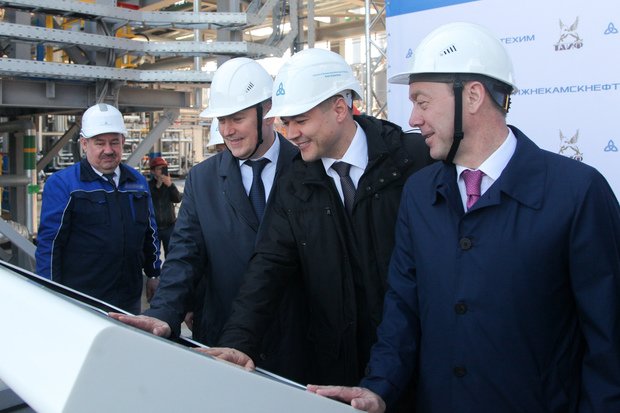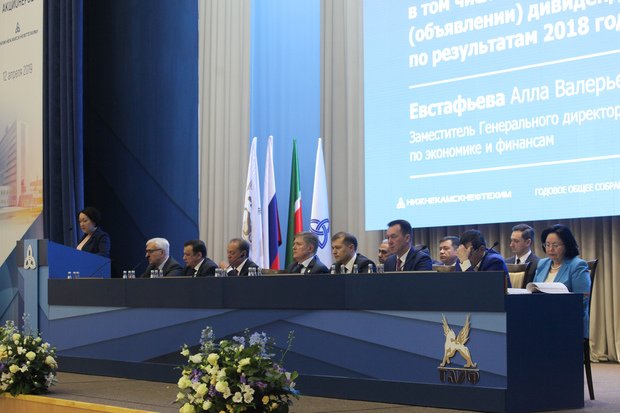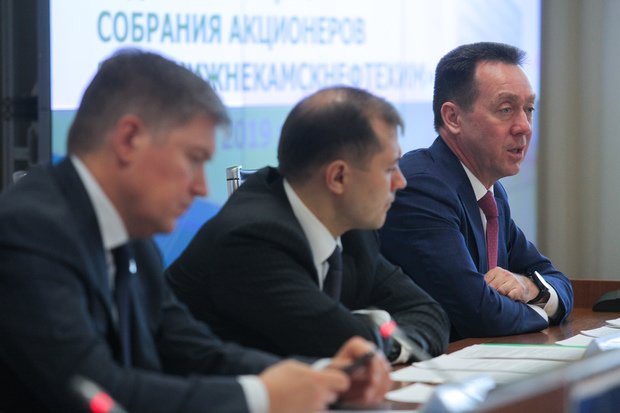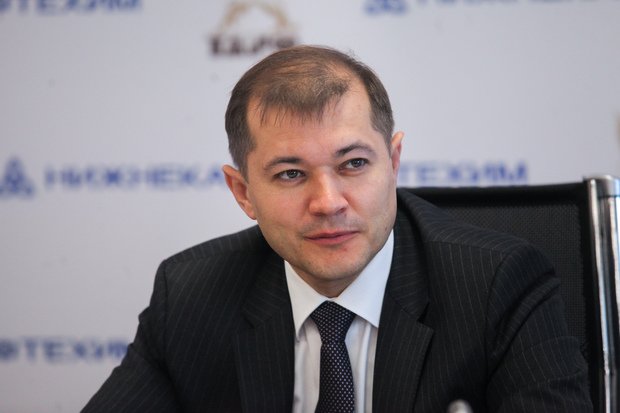Over 36bn rubles on dividends: Nizhnekamskneftekhim to pay shareholders part of profit
Nizhnekamskneftekhim's sales revenue totalled 189 billion rubles in 2018, which is by 16% more than a year ago. The company set a record in the production of goods and strengthened its presence in the Russian plastics market. The enterprise plans to start producing rubber of ecologically friendly tyres and launch methanol production soon. More about the company's performance in 2018, promising projects and the refusal to purchase benzene is in Realnoe Vremya's report.
''We used to have 210,000 tonnes of benzene, now we do 265,000 tonnes''
Nizhnekamskneftekhim's goal is to provide itself with its own feedstock as much as possible refusing purchases in the market. To fully meet its needs for benzene, a benzene unit with a capacity of 50,000 tonnes was built in the ethylene plant. Deputy Prime Minister of Tatarstan Rustam Nigmatullin, Chairman of the Board of Directors of Nizhnekamskneftekhim PJSC Ruslan Shigabutdinov, Deputy Director General and Commercial Director of Nizhnekamskneftekhim PJSC Timur Shigabutdinov and head of the Nizhnekamsk Municipal District Aydar Metshin launched the new facility by pushing the symbolic button.

Benzene is needed to produce ethylbenzene and styrene, which are used in rubber and polystyrene production. Previously, the enterprise had to purchase it in the market but now the company will not only meet its own needs but also be able to sell it.
''We used to have 210,000 tonnes of benzene, now we do 265,000 tonnes. It's good from an economic perspective, and the most important thing is that it will offload the railway, the ecological component is also important – cisterns, discharge,'' Nizhnekamskneftekhim Director General Azat Bikmurzin explained First Deputy Prime Minister of Tatarstan Rustam Nigmatullin when making a round on the site.
The new unit was built within six months by the American GTC's technology, which is an international licenser of oil processing and petrochemical technologies. The launch of the unit is one of the five projects implemented in the ethylene plant in the last three years, including the construction of new SRT-VI pyrolysis furnaces. Two new furnaces not only managed to substitute four old furnaces in terms of capacity but also had a favourable environmental impact, as exhaust gas emissions into the atmosphere reduced. The ethylene plant has 18 pyrolysis furnaces in total: 11 are in operation, the others are in reserve. This allowed to reach up to 611,000 tonnes of ethylene production capacities a year.
36,4bn rubles to be sent to dividend payout
Generally speaking, the enterprise augmented volumes of sold products in 2018. 716,000 tonnes of rubbers were sold, which is by 14,000 tonnes more than a year earlier. The volume of sold plastics rose by 19,000 tonnes, which exceeded 717,000 tonnes. Director General of the enterprise Azat Bikmurzin made these numbers public at the shareholders' meeting.
Record production volumes of many goods were reached: 732,000 tonnes of plastics, 221,000 tonnes of butyl rubber, 223,000 tonnes of benzene, 307,000 tonnes of propylene, 201,000 tonnes of isoprene from isobutene, 107,000 tonnes of isoprene from isopentane. The index of physical volume totalled 103,2%.
The market capitalisation of Nizhnekamskneftekhim PJSC rose by 22,4bn rubles and amounted to almost 112bn rubles by late 2018. Sales revenue increased by 16% and reached 189bn rubles.

''Despite some difficulties in the market of synthetic rubbers, the year was successful for the enterprise. It's the growth of revenue and growth of the index of physical production volume. The effective implementation of projects allows increasing the contribution of Nizhnekamskneftekhim to the country and the republic's budget. So the sum of taxes and payments to all budget levels in 2018 was over 13bn rubles, including to Tatarstan's consolidated budget – 7bn rubles,'' First Deputy Prime Minister of Tatarstan Rustam Nigmatullin said.
In 2018, it was decided to allocate 36,4bn rubles to pay out the dividends. 32,1bn rubles of them will be used to pay common shares and 4,4bn rubles on preferable ones. It will be the first dividends since 2015: there was no payout in 2016 and 2017 because of the ethylene complex project.
Rubbers account for 41% of all sales of the company, plastics do 33%
Synthetic rubbers, which accounted for 41% of all sales, remained the key product for the company. Moreover, 84% were exported: the Nizhnekamsk rubber is supplied to the world's tyre giants according to long-term contracts.
''To improve the effectiveness of rubbers within a programme aimed to augment the production of ISR-3 isoprene rubber to 330,000 tonnes a year, three investment projects were implemented in the isoprene monomer plant. A formaldehyde unit was launched, isobutylene unit was put into operation in 2018, and the isoprene plant had technical rearmament this January,'' Azat Bikmurzin said.

Last year, the company began implementing a styrene-butadiene rubber production project, which is used to make ecologically friendly tyres. The project's capacity will be 60,000 tonnes, it's planned to implement it in 2020.
Plastics, which are mainly sold in the domestic market, accounted for 33% of the total volume of sales. In 2018, 83,6% of plastics were sold in Russia, 13,5% — in CIS countries, and only 2,9% — in Europe. Within import substitution, NKNK aspires to increase sales volumes of its own plastics. First of all, it's linear low-density polyethylene and propylene copolymer.
Own methanol for production optimisation
Nizhnekamskneftekhim plans to start manufacturing methanol. An agreement with Haldor Topsoe company from Denmark was signed in January 2019 for this purpose to build a new methanol unit with a capacity of 500,000 tonnes a year. On the production line, methanol is needed to make synthetic rubber. Now the enterprise purchases the product, this is why it depends on the situation in the world market. Its own methanol production will allow optimising the production and technologies and showing a good economic effect.
''We wanted to deal with this issue a long time ago, but the current economic environment accelerated the issue. We chose Haldor Topsoe considering that the company has a rich history, well-oiled process, which will allow quickly implementing the project and affecting the quality of synthetic rubbers. We hope the project will provide with additional financial advantages and stability in feedstock supply,'' said Chairman of the Board of Directors of Nizhnekamskneftekhim PJSC Ruslan Shigabutdinov at the press conference.

Last year, Nizhnekamskneftekhim kept working on the ethylene complex project with a capacity of 600,000 tonnes and solved the project's financing issue. An agreement on granting an €807-million credit was signed at the Petersburg International Economic Forum. Deutsche Bank AG is the major creditor, but money is also provided by UniCredit Bank AG, Bayerische Landesbank, Landesbank Baden-Württemberg, DZ BANK AG. The financing is divided into 40 parts, Nizhnekamskneftekhim will get the credit in the next four years given to build the complex. Tranches began in 2018.
In addition, Nizhnekamskneftekhim signed another credit agreement with Deutsche Bank AG at the Russian Energy Week. Six German banks such as Deutsche Bank AG, UniCredit Bank AG, Bayerische Landesbank, Landesbank Baden-Württemberg, DZ BANK AG will grant the enterprise €240 million until 2033 to build its own 495 MW power plant.